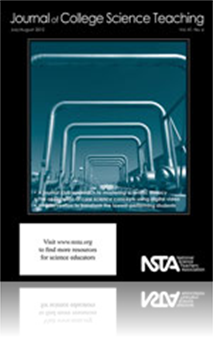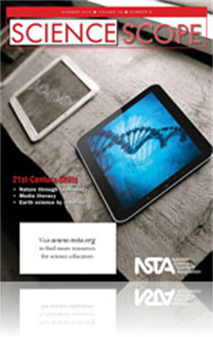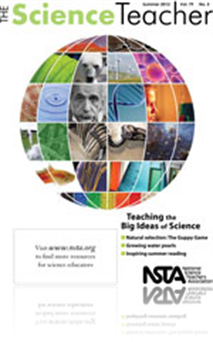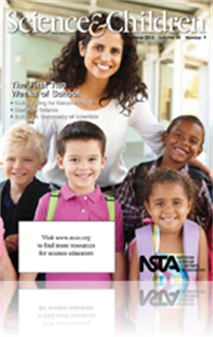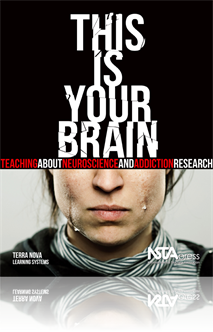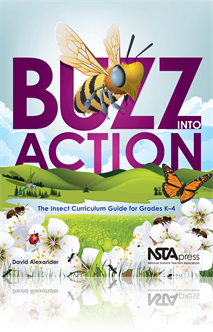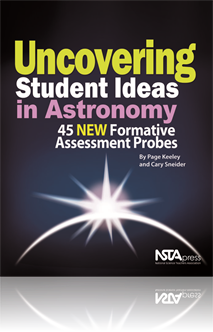All Resources
Journal Article
This article discusses the effect of a new graduate teaching assistant training program on the TA's ability to lead student-centered recitations and on their professional development....
Journal Article
NSTA Recommends reviewers present a summer reading list....
Journal Article
This article describes a journal club mini-workshop in which students learn a systematic method for reading primary literature. Students who have been taught this method are better able to interpret, critique, and present primary articles in a journa...
Journal Article
Idea Bank: The Nuts and Bolts of Enzymes
The Idea Bank provides tips and techniques for creative teaching, in about 1,000 words. This month’s Idea Bank describes an enzyme modeling activity that helped students identify the functions of enzymes using nuts and bolts as reactants/substrates...
Journal Article
Students use a free, authoritative online resource for environmental health issues that supports argument-based inquiry....
Journal Article
This study assesses students' conceptual understanding and interest during the electrochemistry unit of a physics course for nonphysics majors that was revised in light of consistently low ratings from its students. The intervention, designed to impr...
Journal Article
Managing Your Classroom for Success
Creating a well-managed classroom with established procedures should be a priority for a teacher. Organization in the first week of school is the foundation for a successful school year....
Journal Article
Science 2.0: Big Tools for Teaching Big Ideas
This column shares web tools that support learning. This month’s issue highlights powerful Google Docs programs....
Journal Article
This column discusses resources and science topics related to students in grades preK to 2. This month’s issue discusses using circle time to discuss science topics....
Journal Article
The Guppy Game models the balance between the pressures of natural selection and sexual selection. While playing the game, students learn science content in an interactive, student-driven manner....
Journal Article
Career of the Month: Chief Executive Officer
This column shares interviews with professionals using science in the workplace. This month’s issue describes the work of the chief executive officer for the National Ecological Observatory Network....
Journal Article
Enhance Nature Exploration With Technology
This article describes using technology as a tool to provide and enhance students' connection with nature. Students use digital photography of nature to tell a story....
Journal Article
Boxes of mystery objects reveal a coming year of science inquiry. With the use of simple, readily available materials, an efficient mystery box lesson can be a first-week hit that sets the bar for the rest of the year....
Journal Article
Collaborating for Communication
An engineering challenge requires students to work together while providing an opportunity for assessing their learning styles....
Journal Article
Science 101: What, exactly, is acceleration?
This column provides background science information for elementary teachers. In this month’s issue the author discusses the concept of acceleration....
Journal Article
Recharge your motivational batteries with books suggested by NSTA Recommends reviewers....
Journal Article
Adaptable Inquiry-Based Activities About National Patterns of Coal and Energy Use
This lesson about our nation's electricity resources contains inquiry-based lessons designed to deepen students' understanding of key Earth science issues....
Journal Article
Current Research: 2012 Summer Reading Suggestions
Reading suggestions compiled by NSTA's Committee on Research in Science Education, the Association for Science Teacher Education, the National Association for Research on Science Teaching, and the National Science Education Leadership Association....
Journal Article
Green Science: The Keystone XL Pipeline
An opinion piece about a proposed oil pipeline....
Journal Article
Research and Teaching: Transforming the Lowest-Performing Students: An Intervention That Worked
This article describes a small-scale study to investigate if a brief timely intervention focusing on specific study strategies would improve student performance in university science courses....
Journal Article
Building a Community of Scientists
This article provides ideas for starting off the school year with a focus on science and continuing all year long....
Journal Article
Using Google Earth to Teach Plate Tectonics and Science Explanations
The author describes the Cyber-Enabled Earth Exploration Curriculum. Using this curriculum, students progress from making simple observations in the Google Earth environment to creating their own data files and overlays to evaluate and visualize data...
Book Chapter
How Do Drugs Affect the Brain?
In this lesson, students continue to follow the story of Chris through the process of the scientific method as they gather important information about brain function and drug use. Students will also be challenged to develop an explanation of why drug...
Book Chapter
In this lesson, students are introduced to a teenager named Chris, whose story unfolds with each subsequent lesson. The only known fact about Chris is contained in a headline, challenging students to begin thinking like scientists about this hypothet...
Book Chapter
Thinking About the Future of Research
In this lesson, students look toward the future of research, specifically animal research. Students discover alternative methods to animal research and what role these methods might play in the future. Students come to realize that animals will conti...
Book Chapter
In this lesson, students explore the importance of the scientific method and how it applies to both historic scientific discoveries and our every- day lives. The story of Chris continues to unfold as students follow the step-by-step process of the sc...
Book Chapter
In this lesson, students continue the process of inquiry as they follow the steps of the scientific method. Through exploration and discovery, they identify regions and functions of the brain and explore how the brain sends and receives messages. The...
Book Chapter
In this lesson, students explore four categories of neuroscience research—specifically, four approaches that are helping to understand drug addiction—basic biological research, population-based research, behavioral research, and genetic research....
Book Chapter
In this lesson, students work in small groups to analyze and sort a variety of research discoveries. This unit illustrates in part the historical role animals have played in medical research. Students sort these discoveries into several categories, i...
Book Chapter
In this lesson, students look at and clarify their understanding of the concept of ethics. In the first activity, students develop a definition for ethics based on their prior knowledge. Then as a class, students explore the meaning of five key ethic...
Book Chapter
In this lesson, students explore ethical considerations in research, focusing specifically on the example of the inclusion of animals in medical research. They work in small groups to analyze the possible harms and benefits to both humans and animals...
Book Chapter
This chapter contains the unit test and answer key as well as the essay question assessment Rubric for the book This is Your Brain. Other alternate assessment options are also included. ...
Book Chapter
This chapter contains supporting materials such as a Student Glossary, Parent/Guardian letter, resources for teachers, parents, and students for the book This is Your Brain....
NSTA Press Book
This Is Your Brain: Teaching About Neuroscience and Addiction Research
“The need for students’ understanding of the value of the neurosciences—and the damaging effects of illicit drug use, the mechanisms of addiction, and the scientific and ethical basis of animal-based drug abuse research—is critical to creatin...
By Terra Nova Learning Systems
eBook
This Is Your Brain: Teaching About Neuroscience and Addiction Research (e-book)
“The need for students’ understanding of the value of the neurosciences—and the damaging effects of illicit drug use, the mechanisms of addiction, and the scientific and ethical basis of animal-based drug abuse research—is critical to creatin...
Book Chapter
In this activity, students will be able to describe the role decomposers play in an ecosystem and learn to identify organisms that live on the forest floor, in the leaf litter and underground....
Book Chapter
The purpose of this assessment probe is to elicit students’ ideas about gravity. The probe is designed to see if students recognize that gravity exists everywhere in space, not just on Earth....
Book Chapter
The purpose of this assessment probe is to elicit students’ ideas about the size of the Moon. The probe is designed to find out if students understand the idea that something huge can appear to be small if we see it from a great distance, and and t...



